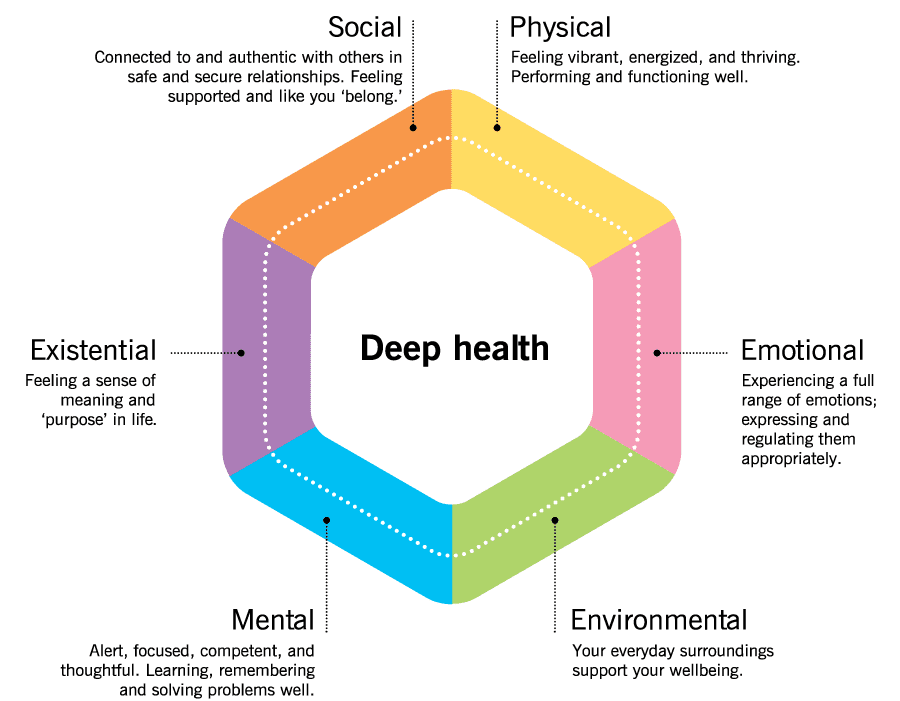Longevity Isn’t Just About Optimizing Physical Health—Here Are the Other Things that Count
There’s been a growing shift in the fitness, health, and wellness industry.
This framework of health includes six interdependent dimensions that influence and interact with each other.

These six dimensions are:
✅ Physical health
This is the aspect of health most familiar to everyone and what people have traditionally associated with being healthy.
It refers to how well your body feels, functions, and performs.
We assess physical health through lab tests—such as cholesterol, hormone levels, and blood pressure—as well as performance indicators like VO2 max, strength assessments, and subjective factors like energy levels and pain.
✅ Emotional health
This involves experiencing a wide range of emotions while maintaining a balance of more positive than negative feelings.
You’re able to recognize, manage, and express your emotions in a direct, mature, and honest way. You also have the resilience to bounce back from intense emotions and the ability to calm yourself when feeling stressed, anxious, or upset.
✅ Environmental health
This focuses on both being and feeling safe and secure, as well as feeling supported by your daily environment.
You have access to essential resources—such as healthcare, nutritious food, clean air and water, and nature—that contribute to your goals and overall well-being.
✅ Mental or cognitive health
This pertains to how effectively you think, learn, retain information, and solve problems creatively.
Your mind is clear and sharp, allowing you to be productive and perform your best. It also encompasses your mindset, self-awareness, and overall perspective on life and the world around you.
✅ Existential or purposeful health
This can be thought of as spiritual or inner well-being.
You have a clear sense of purpose or a deeper “why” guiding your life, and you feel connected to something greater than yourself. You possess a strong sense of identity and self-worth, and you strive to live in alignment with your values and fulfill your purpose through your actions.
✅ Social or relational health
This focuses on building meaningful connections with others.
You cultivate and sustain genuine, fulfilling relationships. You experience a sense of belonging and feel respected, valued, and supported by those around you.
If you have Deep Health, it’s a strong indicator that you’re living a fulfilling and vibrant life—healthy in every aspect. Unsurprisingly, this kind of life is also statistically more likely to be longer, with more of those years being enjoyable and meaningful.
High-impact habits to boost Deep Health (and by extension healthspan, longevity, and biological age)
While many factors influence healthspan, longevity, and biological age, the following offer the highest return on investment. These actions might not seem flashy or cutting-edge—mainly because they’ve been tested and supported by decades of research—but they are the most effective if you want to maximize your Deep Health for the long haul.
The most crucial element? Staying active.
If there’s a “magic bullet,” it’s exercise.
But before you criticize yourself for not being a “gym person,” remember—any movement counts, at any level.
Whether you’re cleaning the yard, vacuuming, playing with your pets or kids, or just taking a walk, remind yourself, “I’m doing great!” Because you are. Every bit of activity makes a real, measurable difference.
To level up, try incorporating a mix of aerobic or cardiovascular exercise, strength training, and stability work (like yoga, tai chi, or balance exercises). Do as much as you can, in ways you enjoy.
For a gold-standard approach, aim for at least 150 minutes of moderate aerobic activity per week (or 75 minutes of vigorous activity), along with two or more sessions of strength and stability training. Doing these activities with friends? Bonus! Now you’re enhancing your social health, too.
In general, more activity is better, as long as you’re enjoying it and giving your body the recovery it needs.
A thoughtful diet—and a mindful approach to other substances—is big, too.
Instead of fixating on foods you “shouldn’t be eating,” shift your focus to the wide variety of foods that support your health and well-being. Think about:
- Lean proteins (from animal or plant sources like fish, chicken, tofu, eggs, tempeh, and Greek yogurt)
- A colorful array of fruits and vegetables (different colors offer different nutrients, so aim for a rainbow on your plate)
- Minimally-processed carbs (whole grains, beans, lentils, starchy vegetables like potatoes, sweet potatoes, and winter squash)
- Healthy fats (from nuts, seeds, avocados, extra virgin olive oil, nut butters, and even a bit of dark chocolate)
Stay hydrated with plenty of water, and for variety, focus on zero-calorie drinks like unsweetened tea and coffee.
Avoid smoking or chewing tobacco, and if you consume alcohol, do so lightly or in moderation.
Additionally, getting quality sleep and managing stress are key to enhancing every aspect of health. Prioritize and protect your rest by creating a comfortable, quiet, and dark sleep environment. Plan to get 7-8 hours of sleep by winding down with a relaxing bedtime routine about 30 to 60 minutes beforehand.
To build emotional resilience and manage stress, incorporate soothing activities into your daily routine. These can vary by person (some may find peace in meditation, while others might get restless), but popular stress-relievers include breathing exercises, time in nature, creative expression (journaling, art, movement), or simply soaking in a warm bath.
A powerful mindset for mental and emotional health—and life in general—is a growth mindset. Those with a growth mindset see challenges and adversity as opportunities to grow and learn, which benefits not only mental health but also longevity. Studies show that individuals with a positive outlook and growth mindset around aging had a 43% lower risk of dying from any cause and lived about 7.5 years longer than those with a less optimistic view.
Lastly, don’t underestimate the power of finding your people—and a purpose.
Seeking and nurturing positive, supportive relationships is one of the best things you can do for your health.
And not just for your social health. Research shows that people who are satisfied with their relationships have better emotional health,3 cognitive health,4 and even physical health.5
In fact, one of the longest studies on human health—the Harvard Study of Adult Development, which tracked participants for nearly 80 years—showed that feeling happy and satisfied in one’s relationships was one of the best predictors of overall health, happiness, and longevity.6
Having a strong sense of purpose bolsters our health and longevity too.
Interestingly, a sense of purpose seems to help people live longer, even when controlling for other markers of psychological well-being. So there’s something uniquely beneficial about having a strong purpose that’s different from, say, being happy.
A purpose can take time to uncover, but you can facilitate that discovery by devoting regular time to the “big questions” in life:
- Who are you, really?
- What do you want your life to be about?
- How do you want to live?
- More practically: What gets you out of bed in the morning? (Is it your family, or showing up for your clients? Or something else?)
But Deep Health isn’t just something you want to achieve—it also serves as a framework to help you make choices.
When you understand how Deep Health works, it can also help you answer the often vague and perplexing question, “How can I feel better?”
Knowing about your own Deep Health can tell you which area of your life to prioritize right now that will make the biggest impact on your overall health.



